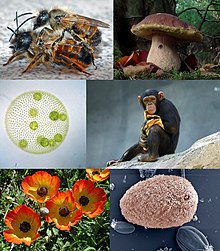What does EUKARYOTIC mean?
Definitions for EUKARYOTIC
-ˈɒt ɪkeu·ka·ry·ot·ic
This dictionary definitions page includes all the possible meanings, example usage and translations of the word EUKARYOTIC.
Princeton's WordNet
eukaryotic, eucaryoticadjective
having cells with `good' or membrane-bound nuclei
Wiktionary
eukaryoticadjective
Having complex cells in which the genetic material is organized into membrane-bound nuclei.
eukaryoticadjective
Of or pertaining to a eukaryote.
Wikipedia
eukaryotic
Eukaryota, whose members are known as eukaryotes (), is a diverse domain of organisms whose cells have a nucleus. All animals, plants, fungi, and many unicellular organisms, are eukaryotes. They belong to the group of organisms Eukaryota or Eukarya, which is one of the three domains of life. Bacteria and Archaea (both prokaryotes) make up the other two domains.The eukaryotes are usually now regarded as having emerged in the Archaea or as a sister of the Asgard archaea. This implies that there are only two domains of life, Bacteria and Archaea, with eukaryotes incorporated among archaea. Eukaryotes represent a small minority of the number of organisms, but, due to their generally much larger size, their collective global biomass is estimated to be about equal to that of prokaryotes. Eukaryotes emerged approximately 2.3–1.8 billion years ago, during the Proterozoic eon, likely as flagellated phagotrophs. Their name comes from the Greek εὖ (eu, "well" or "good") and κάρυον (karyon, "nut" or "kernel").Eukaryotic cells typically contain other membrane-bound organelles such as mitochondria and Golgi apparatus. Chloroplasts can be found in plants and algae. Prokaryotic cells may contain primitive organelles. Eukaryotes may be either unicellular or multicellular, and include many cell types forming different kinds of tissue. In comparison, prokaryotes are typically unicellular. Animals, plants, and fungi are the most familiar eukaryotes. Other eukaryotes are sometimes called protists.Eukaryotes can reproduce both asexually through mitosis and sexually through meiosis and gamete fusion. In mitosis, one cell divides to produce two genetically identical cells. In meiosis, DNA replication is followed by two rounds of cell division to produce four haploid daughter cells that act as sex cells or gametes. Each gamete has just one set of chromosomes, each a unique mix of the corresponding pair of parental chromosomes resulting from genetic recombination during meiosis.
ChatGPT
eukaryotic
Eukaryotic refers to any organism, cell or organismal structure, which contains a clearly defined nucleus and other specialized structures called organelles, all of which are enclosed with membranes. This is a characteristic of all life forms except bacteria, blue-green algae, and other primitive microorganisms. Eukaryotic cells are larger and more complex than their counterpart, prokaryotic cells. Examples of eukaryotes include animals, plants, and fungi.
Usage in printed sourcesFrom:
- [["1896","1"],["1911","23"],["1922","1"],["1940","8"],["1948","4"],["1950","1"],["1953","1"],["1955","3"],["1956","2"],["1957","1"],["1958","1"],["1959","37"],["1960","2"],["1961","2"],["1962","33"],["1963","6"],["1964","10"],["1965","93"],["1966","11"],["1967","95"],["1968","223"],["1969","182"],["1970","406"],["1971","606"],["1972","1671"],["1973","1647"],["1974","2180"],["1975","2263"],["1976","2614"],["1977","3623"],["1978","3440"],["1979","4686"],["1980","7836"],["1981","7694"],["1982","6123"],["1983","8906"],["1984","8378"],["1985","8113"],["1986","8793"],["1987","8736"],["1988","8462"],["1989","10470"],["1990","11239"],["1991","11170"],["1992","9412"],["1993","11786"],["1994","12219"],["1995","14619"],["1996","12636"],["1997","14852"],["1998","13541"],["1999","16907"],["2000","17259"],["2001","14781"],["2002","18116"],["2003","16379"],["2004","23992"],["2005","25506"],["2006","21641"],["2007","25177"],["2008","21208"]]
Numerology
Chaldean Numerology
The numerical value of EUKARYOTIC in Chaldean Numerology is: 5
Pythagorean Numerology
The numerical value of EUKARYOTIC in Pythagorean Numerology is: 2
Popularity rank by frequency of use
Translations for EUKARYOTIC
From our Multilingual Translation Dictionary
Get even more translations for EUKARYOTIC »
Translation
Find a translation for the EUKARYOTIC definition in other languages:
Select another language:
- - Select -
- 简体中文 (Chinese - Simplified)
- 繁體中文 (Chinese - Traditional)
- Español (Spanish)
- Esperanto (Esperanto)
- 日本語 (Japanese)
- Português (Portuguese)
- Deutsch (German)
- العربية (Arabic)
- Français (French)
- Русский (Russian)
- ಕನ್ನಡ (Kannada)
- 한국어 (Korean)
- עברית (Hebrew)
- Gaeilge (Irish)
- Українська (Ukrainian)
- اردو (Urdu)
- Magyar (Hungarian)
- मानक हिन्दी (Hindi)
- Indonesia (Indonesian)
- Italiano (Italian)
- தமிழ் (Tamil)
- Türkçe (Turkish)
- తెలుగు (Telugu)
- ภาษาไทย (Thai)
- Tiếng Việt (Vietnamese)
- Čeština (Czech)
- Polski (Polish)
- Bahasa Indonesia (Indonesian)
- Românește (Romanian)
- Nederlands (Dutch)
- Ελληνικά (Greek)
- Latinum (Latin)
- Svenska (Swedish)
- Dansk (Danish)
- Suomi (Finnish)
- فارسی (Persian)
- ייִדיש (Yiddish)
- հայերեն (Armenian)
- Norsk (Norwegian)
- English (English)
Word of the Day
Would you like us to send you a FREE new word definition delivered to your inbox daily?
Citation
Use the citation below to add this definition to your bibliography:
Style:MLAChicagoAPA
"EUKARYOTIC." Definitions.net. STANDS4 LLC, 2025. Web. 22 Feb. 2025. <https://www.definitions.net/definition/EUKARYOTIC>.







Discuss these EUKARYOTIC definitions with the community:
Report Comment
We're doing our best to make sure our content is useful, accurate and safe.
If by any chance you spot an inappropriate comment while navigating through our website please use this form to let us know, and we'll take care of it shortly.
Attachment
You need to be logged in to favorite.
Log In